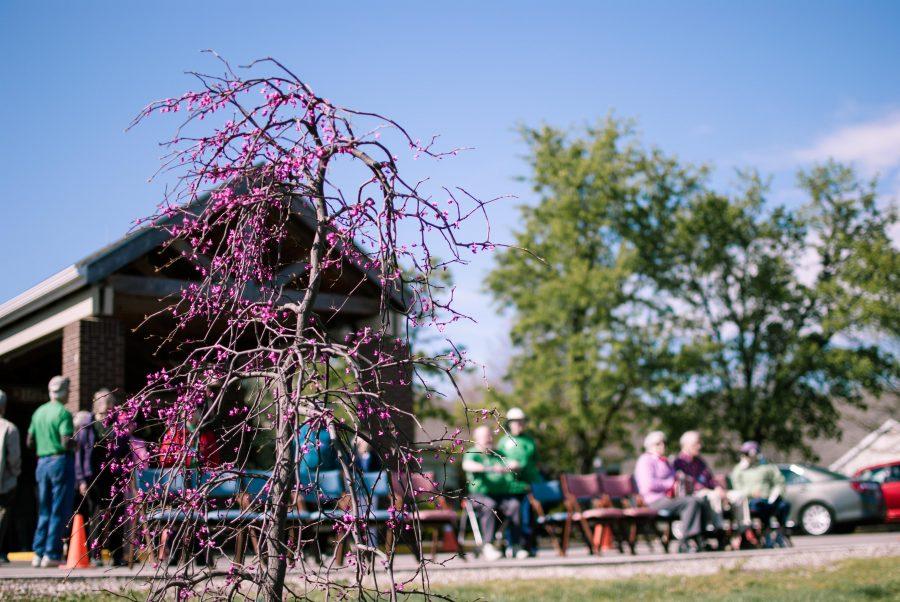Kendal Unveils City’s Second Arboretum
Briana Santiago, Staff photographer
A new tree stands tall after being planted for the grand opening of the John Bartram Arboretum at Kendal at Oberlin. The arboretum has become a new avenue for studying and maintaining the community’s diverse flora.
May 6, 2016
Residents of Oberlin’s retirement community had the chance to show off their handiwork earlier today, when Kendal at Oberlin held a tree-dedication ceremony honoring the official opening of the John Bartram Arboretum. Over 1,100 trees have been planted at Kendal since the retirement community opened 25 years ago. The namesake of the greenery is John Bartram, a Pennsylvania Quaker from the 1700s who is considered to be the first American-born botanist.
Kendal resident Larry Dunn said the planting project was his brainchild. He and a small group of other residents noticed that some of the trees on Kendal’s campus were struggling to keep healthy and were showing signs of decay, he said. The group began to lay plans for the arboretum in the summer of 2015 and have had a relatively smooth journey through the past eight months of planning and planting.
“There is a lot of support among the residents and the Kendal administration to bring the arboretum to fruition,” Dunn wrote in an email to the Review. “By the end of December, we had achieved an important step when the [arboretum] was accredited as a Level 1 arboretum by ArbNet, the international network of arboretums.”
For Dunn, the purpose of the tree garden is to educate residents and visitors who wish to learn more about the greenery on Kendal’s campus.
The arboretum will also provide the hands-on experience necessary for residents who wish to improve the management of the community’s trees and shrubs, said Melissa Reed, chair of the Horticulture Committee at Kendal and member of the city’s Open Space and Visual Environment Commission.
“[We want to] learn from what the land is telling us to improve how we select and care for our trees,” Dunn wrote. “I had the idea that putting this effort in the context of managing our campus as an arboretum would help us to better focus our energies.”
ArbNet’s Arboretum Accreditation Program is the first of its kind to accredit internationally. The organization considers any arboretum or public faunal space occupied by “woody plants” for accreditation, including botanical gardens, cemeteries, zoos, college campuses and municipal parks.
There are four levels of accreditation, based on the number of species of woody plants. Various other selection criteria include a space’s specific arboretum plan, the number of employees and volunteers and a governing body.
When Dunn’s band of arborists proposed their plans to the Executive Director of Kendal at Oberlin, Barbara Thomas, she was excited about the initiative and recommended that they apply for a grant from Kendal’s Charitable Fund, said Anne Helm, a Kendal resident that worked on the project.
The Kendal Charitable Fund makes annual development grants to Kendal Corporation’s affiliate retirement communities, and Kendal at Oberlin has been encouraging residents to create proposals for the past couple of years. Conveniently for the arboretum committee, the 2015 grant-proposal period occurred while they were organizing the arboretum.
The arboretum committee’s grant proposal was endorsed by Kendal at Oberlin’s Resident Association. The proposal suggested using the funding for some of the arboretum’s start-up activities, such as establishing a comprehensive landscape plan and improving the labeling of the trees.
The proposal was funded last October, and the committee is in the process of completing the activities detailed in the document.
According to Helm, some of the arboretum’s projects have included an educational collaboration with Kendal’s Early Learning Center. Environmental Studies students from the College have also been involved in the research of the arboretum, a connection the committee is hoping to continue.
“We are interested in having a joint event with the College, perhaps next year’s Arbor Day or something else special,” Reed wrote in an email to the Review. “We already have a relationship with [the College’s] Environmental Studies program; for the second semester in a row, a pair of Environmental 101 students have surveyed trees.”
In keeping with community engagement plans, Kendal dedicated an American Tulip Tree, the signature tree of the John Bartram Arboretum, to the city following Friday’s grand opening.
The tree was planted today in the Martin Luther King Jr. Park at 2 p.m. Children from the Early Learning Center, members of City Council and members of the arboretum committee were involved in the dedication.
“One of our central ideas is for the arboretum to be a new avenue [ for] Kendal’s engagement with the greater Oberlin community,” Dunn said. “Trees are important and beneficial to everyone, and we believe our arboretum effort can help us all to care for our trees more effectively. The idea of donating trees to other Oberlin institutions was a key element funded by our [Kendal Charitable Fund] grant. The city of Oberlin is a Tree City USA participant, so it seemed a perfect first recipient of one of our tree donations.”
The tree-dedication ceremony will serve as the city’s observance of Arbor Day.




















